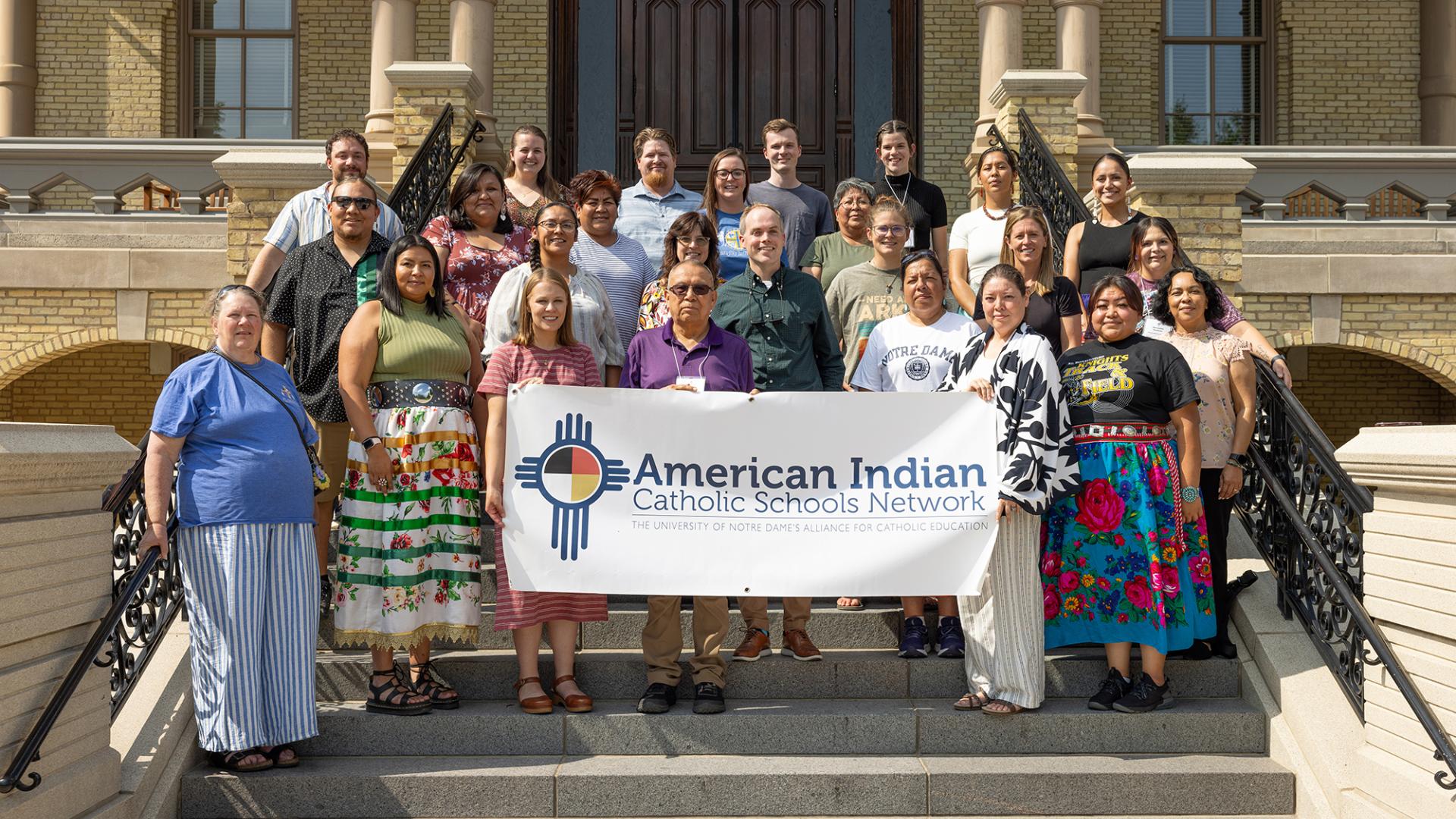The AICSN Summer Institute is a week-long professional development opportunity for educators at American Indian Catholic schools. This year’s convening brought together teachers and school leaders from seven Native American Catholic schools. These educators engaged in three mini-courses, visited Indigenous sites in the South Bend region, and had opportunities for prayer and reflection.
Engaging Mini-Courses
The three mini-courses were led by a fantastic group of educational experts. Participants gained practical skills and knowledge in each mini-session, as one participant noted, “I appreciated each of the sessions and felt that they were very accessible and adaptable to my classroom.”

Trisha Moquino, an expert on language revitalization from the Keres Children Learning Center (KCLC) Montessori school, conducted sessions on integrating Indigenous languages and cultures into the classroom. Her insights and experience offered strategies for preserving and promoting Native language acquisition in K-12 education. Moquino’s sessions were especially impactful for Randilynn Boucher, a school leader at Maȟpíya Lúta, who said, “Trisha and I have stayed in contact since the Summer Institute.” Moquino and Boucher shared conversations about their shared mission and the importance of persistence in their work, “The work we do is hard, we’re talking about education, we’re talking about language, and we’re talking about the continuance of our people. And so by having another person that you can relate to, who truly understands what it's like to go through this on a day-to-day basis, it’s the support system that everybody should have.”
Tamera Miyasato and Nebeesh Shognosh, both Notre Dame graduates and Indigenous educators, led a series of sessions on fostering Indigenous Brilliance within educational settings. They shared innovative approaches to recognizing and nurturing the unique strengths of Indigenous students in their presentations. Miyasato and Shognosh emphasized the importance of storytelling and modeled methods by which storytelling can be incorporated into educators’ instructional practices.
The third session, which focused on mindfulness strategies, was facilitated by Gina Leach and Tessa Zimmerman from Upstream Education. The strategies shared by the Upstream Education team are particularly crucial in today's K-12 environment, where many students are navigating mental health challenges. Zimmerman noted that she truly enjoyed delivering professional development to this group, “I honestly think it was so special, because we rarely have the opportunity to spend three days with a group of educators.”

Cultural and Spiritual Enrichment
Beyond the classroom, the Institute included several enriching excursions. The group engaged in a Visio Divina in the chapel of the Raclin Murphy Museum of Art and visited Lake Michigan. One of the highlights of the Summer Institute was a presentation about the historical connection between the Potawatomi tribal nation and the University of Notre Dame, which was delivered by Zada Ballew, the historical consultant and cultural liaison for the Native American Initiative at Notre Dame.
Looking Ahead
Throughout the Institute, educators not only gained valuable skills and knowledge but also built a supportive community with peers from other Indigenous Catholic schools on Native American reservations. This sense of camaraderie and shared purpose will enhance this group of educators’ collective efforts in the classroom. As one attendee described, “It was valuable to spend time in fellowship with the other attendees and the facilitators.” Randilynn Boucher echoed this sentiment, as she said one of the most valuable aspects of the convening was the ability to learn from presenters and fellow attendees who have “years of experience in their communities and working with youth.”
As they return to their schools, these educators possess new strategies, cultural insights, and a strengthened network, all of which will contribute to a richer educational experience for their students in the 2024-2025 school year. At AICSN, we are deeply grateful for these educators and their steadfast commitment to their students.
 Alliance for Catholic Education
Alliance for Catholic Education
